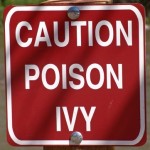A thought about allergies

In a lab in Japan, 13 people who are extremely allergic to Poison Ivy, undergo an experiment. They see two leaves in front of them. The familiar, dreaded Poison Ivy leaf and a harmless leaf.
One arm will be rubbed with Poison Ivy, the other arm rubbed with the harmless leaf.
After being blindfolded they are told first that they are having their arm rubbed with Poison Ivy however it is actually the harmless leaf. All 13 participants have an allergic reaction – skin changes colour, inflammation process begins, lumps form then blisters. Remember they were rubbed with a harmless leaf but BELIEVED they were touched by Poison Ivy.
Then on the other arm they are rubbed with Poison Ivy but are told it is the harmless leaf. Only 2 participants have a reaction. These are people with a known allergic reaction to poison ivy having no reaction to it.
WHAT THE !!!
In this famous experiment (Blakeslee, 1989) we clearly see the role of the brain in allergic / inflammatory responses.
Firstly, the reaction to the harmless leaf is clearly a physical one – swelling, the inflammation, change in skin colour, the pain and blistering. But it is NOT the poison ivy that is doing it. These physical responses are the body defense against a perceived threat – and the brain is driving the show.
And when the people are not responding to the Poison Ivy, even though they are allergic, it is the brain interrupting a habitual physiological response.
So what exactly are they allergic to? Poison Ivy or the thought of Poison Ivy? Clearly both. This study certainly highlights the role the brain plays in determining what response is appropriate to a stimili. The brain can turn the response on or intervene when the trigger is present and decide not to respond. As the brain plays such an integral role in it all, it seems like a pretty good place to direct our attention when looking at treatment options.
Most of my work is about retraining people out of inappropriate responses, whether they are physical, emotional or mental responses, and looking at the brain’s role is critical.
The brain plays a far greater role in human health than most people recognise. Luckily we have come a long way from the idea that if the brain is playing a role then the condition is made up or the person is crazy.
What are you habitually responding to in an extreme way?
Is it time to use your brain for a change? 🙂
